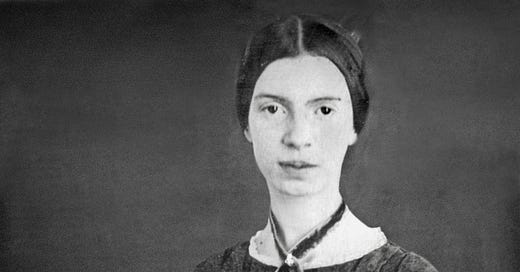Darwin and Dickinson
Also: Kafka the “sex-mad dandy,” the forgotten work of Rosemary Sutcliff, the strengths and weaknesses of “Knife,” growing up with Flannery, and more.

In Natural Magic: Emily Dickinson, Charles Darwin, and the Dawn of Modern Science, Renée Bergland argues that both Dickinson and Darwin were obviously enthralled by the “new sciences and at the same time strove to preserve the magic of nature.” In his review of the book in The Boston Globe, Craig Fehrman writes that “there isn’t much in Natural Magic that is technically new,” but it is interesting nevertheless because “it’s the sort of wide-ranging and spirited book that most academics never write.” More:
When Darwin returned to Britain, he focused on researching and writing. Dickinson headed to school, eventually studying at Amherst Academy and the Mount Holyoke Female Seminary. One of Bergland’s most surprising points is that because science was still so new in the mid-19th century, it was more open to women than other academic disciplines. In fact, the word “scientist” was coined because so many women were making discoveries that traditional descriptions like “men of science” no longer made sense. The first reviewer to deploy “scientist” in print was writing about Mary Sommerville’s On the Connexion of the Physical Sciences, which appeared in 1834 and remained Britain’s best-selling science book until it was supplanted decades later by On the Origin of Species.
All of this meant that for a brief period in Dickinson’s Massachusetts, the boys studied Greek and Latin while the girls studied the physical sciences. At Mount Holyoke, which one student called “a castle of science,” Dickinson adored chemistry and geology and botany. In a letter to her brother, she wrote that she was “all engrossed in the history of sulphuric acid!!!!!” As Bergland notes, “the five exclamation points are hers.”
One of the charming ironies revealed in Natural Magic is that Dickinson received a more rigorous education in the sciences than Darwin ever did. At the same time, Darwin read more literature than one might expect. When Higginson traveled to Darwin’s home, they discussed Lewis Carroll. “It was altogether delightful,” Higginson recalled, “to see the man who had revolutionized the science of the world giving himself wholly to the enjoyment of Alice.”
Dickinson only mentions Darwin twice in her letters: “In one letter, written in 1871, she muses on the way death and life coexist: ‘why the Thief ingredient accompanies all Sweetness, Darwin does not tell us.’ In another letter, from 1882, she mentions a man comparing himself to Christ. ‘But we thought,’ Dickinson adds, ‘Darwin had thrown “the Redeemer” away.’ Fehrman writes that these ambiguous references to Darwin “show what it feels like to slowly absorb a world-shifting theory.” I’m not so sure. Dickinson is cagey, and these offhand remarks might even be taken as critiques.
In other news, staff members who run the Free Library of Philadelphia’s Author Events program have been fired. The programmed Author Events were canceled, but then the Free Library said this was not the case. What is going on? Ximena Conde and Elizabeth Wellington explain in The Philadelphia Inquirer:
The team was well connected in the publishing world and known for being able to execute well-attended and well-run events. The team took care of everything from booking and promoting events, to arranging book deliveries so attendees could buy copies. They also maintained a YouTube and podcast feed that reached up to 3 million people this past year.
In an interview with The Inquirer, the four people behind the series said it was a difficult decision they’d all been mulling over for some time. Andy Kahan, Laura Kovacs, Jason Freeman, and Nell Mittelstead described a worsening workplace culture where they felt their work didn’t matter, coupled with the increasing departures of talented colleagues.
Sebastian Milbank revisits the work of Rosemary Sutcliff: “On paper, Sutcliff — a disabled female novelist — is prime fodder for a literary rediscovery. Her 1978 novel, Song for a Dark Queen, about the life of Queen Boudica, even won a feminist book prize. But in other respects, her work is profoundly unfashionable and only getting more so. Not for Sutcliff the prurient explorations of trauma, or snide, subversive spins on the recent past that so entrance contemporary critics. Instead, her books are firmly in the tradition of an even more unfashionable author: Rudyard Kipling.”
Keep reading with a 7-day free trial
Subscribe to Prufrock to keep reading this post and get 7 days of free access to the full post archives.



